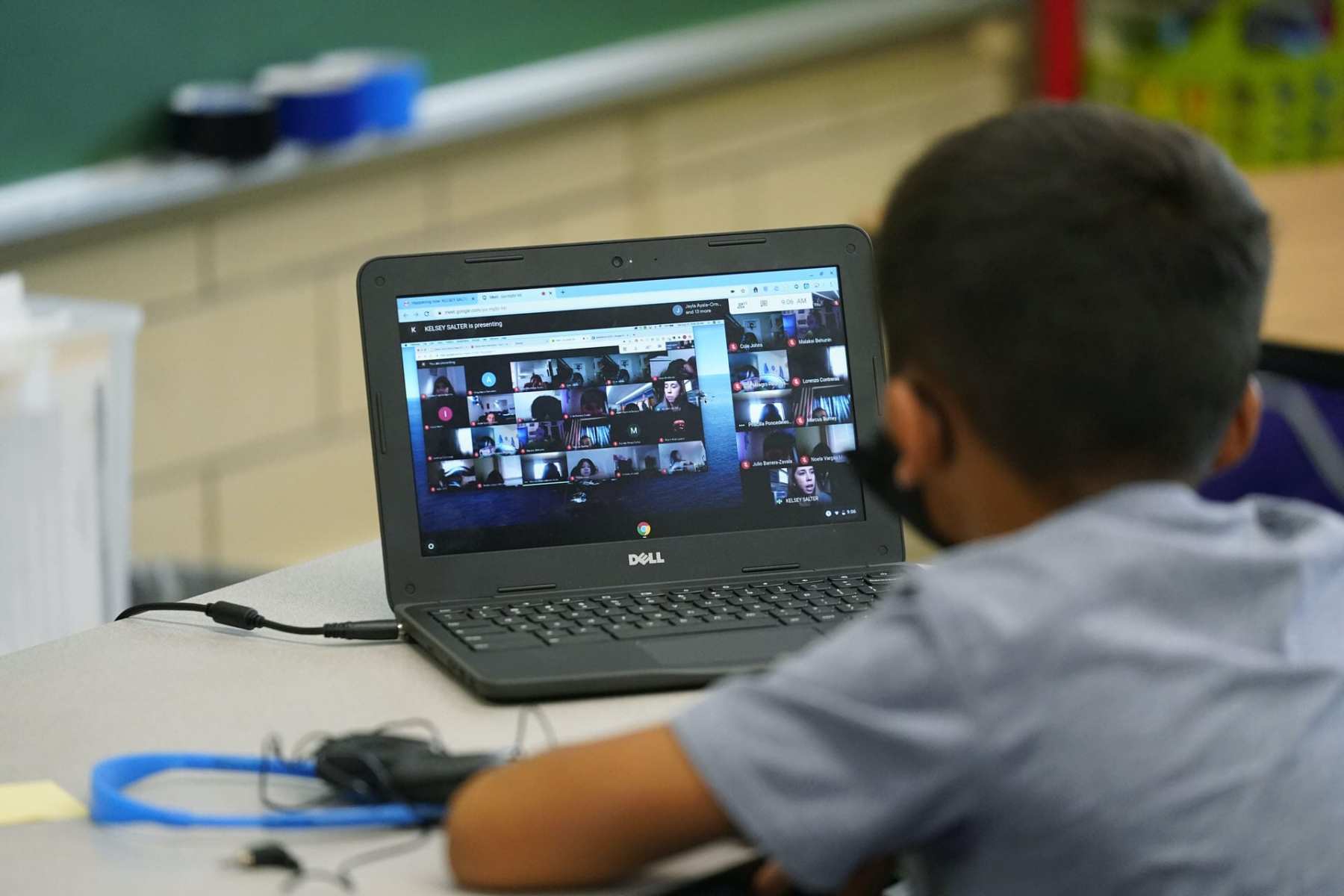As the economic collapse stretched into May, Angélica González realized how untenable it was to be a parent in a pandemic.
Coronavirus cases were rising by the hour, businesses were closing by the day, and every week her list of responsibilities grew. She was a single mom to three kids and a full-time law clerk when the pandemic began. By May, she was also a full-time teacher, a full-time caretaker and a full-time therapist to her child who had plunged into depression. At work, she was the worst performer.
“I was failing at every front. I was failing at work, I was failing as a mother, I was failing as a provider, I was failing at caring for their emotional needs,” said González, 32. “I noticed that I couldn’t meet any need at all.”
Searching for a solution, she found one in the Families First Coronavirus Response Act (FFCRA), signed into law in March. Tucked in the legislation was a provision that allowed parents to take up to 12 weeks of paid sick leave at two-thirds pay to care for a child whose school or daycare had been shuttered due to COVID-19.
By June, González started to take the time, sometimes just a few hours each day so she could focus on her kids without worrying about what she was missing at work. As her family life regained stability, her hope was to stretch the leave as far as she could, particularly as the return to school in the fall became uncertain.
But on August 27, just days before her kids’ school year was set to start — her kindergartener would return in person at a Seattle private school but her older kids, ages 8 and 14, would stay remote — the Department of Labor quietly issued updated guidance on FFCRA.
If there was an opportunity for students to return to school in person, and parents chose to keep their kids in remote learning, they would no longer be guaranteed access to paid leave for child care purposes, the department said in an addition to its frequently asked questions page on the provisions of the law.
So far, González’s older children only have the option to go to school remotely, so she can still access the child care benefit. But their schools plan to reassess that plan later this year. Meanwhile, her benefits are running out.
When they do, either because time takes them or the new regulation does, she doesn’t know what she will do.
The DOL’s change in guidance sparked concerns from family and women’s advocates. They say the new limitation will hurt workers who may choose to keep their children at home for myriad reasons, including to protect vulnerable family members from exposure to COVID-19, or to provide a better alternative for children with disabilities or special needs who may struggle to follow new guidelines for in-person learning. Even before the new guidance, the paid sick leave provisions in the FFCRA included exemptions for businesses with more than 500 employees or fewer than 50. In all, only about 20 percent of workers were eligible.
Now, even fewer will be covered, said Erika Moritsugu, vice president of the National Partnership for Women & Families, a non-profit, non-partisan organization focused on gender policy. The group is calling for the Department of Labor to reverse the decision.
“It goes against what we view as the law’s policy purpose of protecting the public health,” Moritsugu said. “Even when schools are physically open, in-person attendance still poses major risks for many students and their families. There are some families that need to keep their children home.”
When asked about the reason for the change or how legally binding the guidelines would be for companies whose employees are seeking to access FFCRA benefits, the Department of Labor said in a statement that responding to the COVID-19 pandemic remains a top priority. “[The department’s Wage and Hour Division] has simultaneously addressed the critical need to provide information to the American workforce about their rights and benefits available under the Families First Coronavirus Response Act (FFCRA) and the need to enforce the new law to ensure workers get the protections they need and deserve.”
Paid sick leave advocates view the new guidelines as further dissolution of a policy that, though limited in its scope and duration — the 12 weeks are available through the end of the year — provided the closest thing to national sick leave paid for by the federal government. The United States is one of the few developed nations without a universal paid sick leave policy.
A paid sick leave policy would be impactful for women, in particular, because they’re more likely to be in the low-wage jobs that lack the benefit. Of the 40 lowest paid jobs in the country, women make up nearly two-thirds of the workforce. And working mothers are more likely to do the majority of the child care, about 40 percent more during the pandemic than their male partners in heterosexual relationships in which both people are working.
Earlier this year, the National Partnership for Women & Families found that one in five Americans it surveyed planned to take or had taken the new paid sick leave policies in the coronavirus response packages. About 7 percent were using it for child care specifically.
For businesses, the issue of paid leave has been a contentious point. Many argue they can’t afford to offer the benefit themselves, and others have pushed for a state-level or national-level policy that takes the onus off the employer and allows for a hybrid model, in which the government and employees can also pay into a system to administer the benefit.
But with those policies still far off in some states and at the federal level, families like González’s are relying on the temporary relief in the coronavirus stimulus package. Now, that hope it gave them feels misplaced.
“We have a government that just doesn’t understand,” González said. “We need more women in office that know what women are going through today — the average, everyday, nitty gritty woman that knows how it is to work really hard, what you’re coming against. We just have a lot of very privileged people in office and they don’t get the need, and so that’s why they throw these [policies] out. That’s why they’re not thinking about us.”
At Kate Davenport’s Minneapolis recycling business, staff have already been prevented from using federal paid sick leave for child care.
Essential workers, like the 120 people she employees, were given access to daycare centers when the centers closed for everyone else. But, out of concern their children might contract the virus, some of her staff chose to keep their kids at home anyway, which meant they couldn’t access the benefit.
Davenport, whose company, Eureka Recycling, is known for offering a living wage and benefits to staff, said it wasn’t easy to say no. But she was following the guidelines from the Department of Labor and advice from her lawyers as she searched for a solution.
“Oftentimes it’s not coming from a place of not wanting to be compassionate, but we just have to figure that out,” she said. “Every small business has had to completely reimagine their staffing model in the last six months. That takes a lot of work.”
Her team has been trying to decide whether it can turn positions that are full-time into part-time to help some of her employees who need flexibility, for example. Davenport, who is the co-president at Eureka, is also in favor of a statewide or national paid leave policy that’ll help small businesses compete with larger companies that can afford to offer the benefit, as well as developing a framework that makes it easier for businesses to implement the policy.
“Something we often talk about is there’s the cost of the paid sick time and there’s the cost of the administration of it. And I think businesses often object because the whole thing feels overwhelming,” she said.
Offering a universal policy could also be a benefit for companies that operate across states where the rules are different. Currently, 13 states and Washington, D.C., have enacted laws to require paid sick leave.
Tiffany Turner, the CEO and founder Adrift Hospitality in Washington state, wrestled with the challenge brought by that patchwork of legislation this year when she tried to get benefits out to her staff in Oregon, where she and her husband own a small inn.
Washington, where the rest of their properties are located, recently passed a statewide paid sick leave policy that employers and employees pay into. But Oregon doesn’t have one, so Turner had to tap into the FFCRA when one of her staff members got sick.
Her employees haven’t had to use the child care aspect of the paid leave policy yet, but the existence of an option, Turner said, helps ensure she can keep her staff employed. When she had to lay off about 100 of her employees in March, she called it “hell week.” She doesn’t want to do that again.
“When an employee has to make a decision to take care of a family member and there’s no way for the business to engage in helping and supporting that, typically you’d lose the employee,” Turner said. “It doesn’t make any sense whatsoever to fight against something that will essentially help you retain your employees.”
That problem multiplies when you’re an employer and a parent.
Grace Oedel, executive director of the Northeast Organic Farming Association of Vermont, has been able to offer the additional federal paid sick leave to her employees this year, with many of them taking advantage of it to care for their children.
But she can’t take it herself. Her 4-year-old son has a chronic respiratory illness that last year had him in and out of the ER for six weeks. His doctor has highly recommended that he not return to school in person and that her 2-year-old stay home, too, even though their school has reopened.
“It has been intensely overwhelming. There have been moments of really crippling anxiety,” Oedel said. “At the same time, I am aware of my positional power and my inherent privilege — I’m a middle class, White person with options. I’m also aware that this is not just happening to me … And there are really structures making it happen.”
Those structures may be changing in a year where paid sick leave has become a major issue for workers and businesses.
The passage of the paid sick leave provisions in the FFCRA was a breakthrough. Many Republicans, who have historically opposed paid sick leave because of the concern over the impact to business owners, supported the legislation. A survey by researchers at the University of Maryland found that as the pandemic wore on, more Republican voters have also become supportive of permanent family medical leave.
President Donald Trump has mentioned paid family leave in all three of his State of the Union addresses, and his daughter and adviser Ivanka Trump has made issues of paid sick leave and child care her top priorities. This week she tweeted in support of the $15 billion allocation for child care in the Senate Republican’s stimulus package, which was initially announced in July. It, like its Democratic counterpart in the House, is unlikely to get bipartisan support.
Still, the issues got almost no time during the Republican National Convention last month, and Ivanka Trump, who did touch on child care, omitted any discussion of the current challenges from her address.
“We still have a ways to go to get Republicans on board with personal medical leave and caregiving leave and not just maternity and paternity leave,” said Whitney Pesek, legislative director at Paid Leave for the U.S., a national advocacy group. “We’ve come a long way but we still have a ways to go.”
To keep pushing the issue, Paid Leave for the U.S. will be running the first national ad campaign during a presidential election year specifically on national paid leave.
Pesek said the national reckoning on race has elevated conversations about policies that could address issues of systemic racism and sexism, with paid leave being one that women and — particularly women of color — stand to benefit from the most, partly because they are most likely to leave a job to care for a family member or a child.
The Department of Labor’s determination, Pesek said, is a step in the other direction.
For businesses like Davenport’s recycling company, having that benefit this year kept them operating safely during the pandemic and kept staff onboard. It helped other businesses that have never offered paid leave realize that, too.
She believes the momentum is there.
“It’s one of those things where people have experienced the benefit of it,” Davenport said. “The case has been proven, so we can’t go back.”







